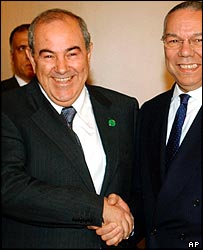Iyad Allawi is
one of a US-backed clique of secular Iraqi opposition figures who
lived in exile until the fall of Saddam Hussein's regime in April
2003.
But he has the advantage as prime minister - to paraphrase one
commentator - of being equally mistrusted by everyone in Iraq's
multifarious population.

Mr Allawi has received the endorsement of some
Washington departments |
Religious
leaders think he is too secular, the US-led coalition now sees him
as a critic, for the anti-Saddam opposition he is an ex-Baathist,
while ordinary Iraqis say he is a CIA man.
Born in 1945 to a prominent Shia Muslim merchant family, Mr
Allawi trained as a neurologist and joined the Baath party
underground movement as a young man.
But when the party came to power, he fell out with the rising
hard man Saddam Hussein in the early 1970s and was forced to go into
exile.
He was badly wounded in an assassination attempt while living in
the UK in 1978, believed to have been ordered by Saddam Hussein.
Well-connected
Mr Allawi went on to co-found the Iraqi National Accord (INA)
party, which is known for attracting disillusioned former Baathists
from the military and security fields.
From its foundation in 1991, with the backing of the US Central
Intelligence Agency and British intelligence, the group supported
the idea of fostering a coup from within the Iraqi army to overthrow
Saddam Hussein, but its attempts ended disastrously.
Correspondents say Mr Allawi is well-connected politically in
Washington and London, has extensive business dealings and has close
relations with Saudi Arabia and Kuwait.
Since joining the US-appointed Iraqi Governing Council, he has
publicly opposed the purging of members of Baath party from
government positions.
His work has been focused on running the IGC's security
committee, which has been responsible for building up the new Iraqi
army, police and intelligence service.
